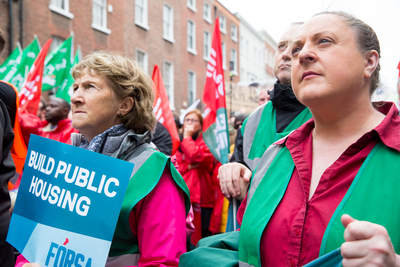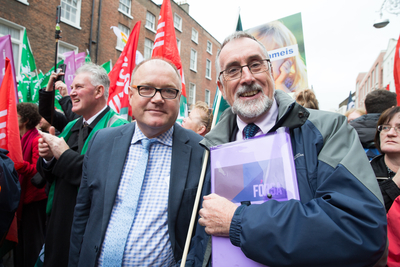Second pay adjustment under PSSA kicks in
by Diarmaid Mac a Bhaird
The second pay adjustment provided for in the Public Service Stability Agreement (PSSA) came into effect from 1st October 2018. The adjustment is the second this year, following a 1% adjustment in January.
The second pay adjustment provided for in the Public Service Stability Agreement (PSSA) came into effect from 1st October 2018. The adjustment is the second this year, following a 1% adjustment in January.
Updated salary scales for grades represented by the union, across the unions divisions are now being updated on the Fórsa website. Salary scales for the Education, Civil Service and Local Government divisions are already available, while updates on salary scales for the other divisions will be completed shortly.
Please see the links below for updated scales here:
Main provisions of the Public Service Stability Agreement (PSSA):
- 1st January 2018: 1% pay adjustment
- 1st October 2018: 1% pay adjustment
- 1st January 2019: Pension levy threshold up from €28,750 to €32,000 (worth €325 pa)
- 1st January 2019: 1% pay adjustment for those earning less than €30,000
- 1st September 2019: 1.75% pay adjustment
- 1st January 2020: Pension levy threshold increased to €34,500 (worth €250 pa)
- 1st January 2020: 0.5% pay increase for those earning less than €32,000
- 1st October 2020: 2% pay adjustment
 |
|
Institutes of Technology staff to commence industrial action next week
by Niall Shanahan
Fórsa members in library, professional management and support staff roles in the higher education sector will engage in industrial action from next week in a dispute about job evaluation.
A ballot for industrial action in July returned a vote of 85% of members backing industrial action, with the aim of securing a comprehensive job evaluation exercise.
Fórsa has served notice to individual Institutes of Technology that, from next Monday (15th October) members will not engage in any form of communication including making and taking phone calls, video conferencing, or responding to or forwarding emails.
This follows more than three years of efforts to ensure the implementation of the commitment agreed in May 2015, as part of the negotiations that lead to the Lansdowne Road Agreement, in relation to job evaluation for library, clerical, administrative and support grades.
In a letter of notice to the colleges, Fórsa official Stella Griffin said, “After three years of raising the issue - and alerting the Minister to the inevitable consequences of a failure to deliver on the commitment made - we appear to have little choice but to resort to such action.
“We have exercised enormous patience while trying to reach agreement with employers on an approach to deliver on the commitment. The response to date has been woefully inadequate.
“We believe that we have no other choice but to resort to industrial action following receipt of a mandate for action up to and including strike action from our members,” she said.
The purpose of job evaluation is to measure whether or not a specific post is correctly graded. It assesses the skills and responsibilities required of a particular post, rather than the individual performing it.
Pressure
Since 2008 the higher education sector has seen a very large increase in the number of students enrolled while staff numbers fell. Stella explained that this has seen a significant increase in total productivity as library, professional and support staff bore the brunt of these developments.
"The sector relied on the goodwill and dedication of its staff with many individuals assuming additional and more onerous duties without recompense. This situation was exacerbated by the failure to fill higher grade posts over the past number of years. In some cases posts were filled by agency staff on a temporary basis,” she said.
School Secretaries mobilise for pay equity campaign
by Niall Shanahan
Fórsa’s School Secretaries branch is continuing preparations for a national campaign to improve secretaries’ pay next year.
Fórsa’s School Secretaries branch is continuing preparations for a national campaign to improve secretaries’ pay next year.
Lead organiser Joe O’Connor said the campaign will launch in 2019 when negotiations are due to commence under the current adjudication agreement.
“We intend to use the intervening months to do the required planning and groundwork for the campaign, develop campaign messaging and materials, and raise awareness in the political system of the plight of school secretaries,” he said.
Pay inequality
Caretakers and secretaries pay rates vary, as they are determined by the individual board of management of each school, and paid from the ancillary grants paid to the schools by the Department of Education and Skills.
Almost all are paid below the scale paid to equivalent public service workers, including a minority of secretaries and caretakers who are paid directly by the department.
In a recent in-depth feature on the treatment of school secretaries, respected journalist Michael Clifford wrote in the Irish Examiner that school secretaries “have precious little power in a system in which power talks and those without it must do without.”
He spoke to Kathleen O’Doherty for the article, describing how she had, in 2001, written to the then minister for education pointing out the apparent disregard for her role. “She has written to every minister since, and each one has quietly ignored the problem.”
Kathleen said: “We’re not fighting against the boards of management, we know their hands are tied. But there is no security whatsoever. In fairness to principals and boards, a secretary’s wages may be the last thing taken into consideration simply because things are so tight.”
Arbitration
Under the terms of a 2015 arbitration finding, the payment of four separate pay rises of 2.5 per cent for school secretaries and caretakers will be completed by 2019. The branch plans to launch the campaign once these pay improvements have been completed.
Fórsa official Barry Cunningham explained that the planning for the campaign has gained momentum this year, following the union’s Education conference event in April. Since the conference Fórsa's School Secretaries branch has grown by 15%
See also:
Should school secretaries have more power in the education system? - Michael Clifford, Irish Examiner, Thursday 27th September 2018
5,000 'new entrant' SNAs to benefit from new measures
by Seán Carabini
Following the recent introduction of measures to resolve outstanding issues with new entrants pay, some 5,000 SNAs, hired since September 2011 on lower rates of pay, are set to benefit.
Following the recent introduction of measures to resolve outstanding issues with new entrants pay, some 5,000 SNAs, hired since September 2011 on lower rates of pay, are set to benefit.
Fórsa was at the forefront of the negotiations with the Department of Public Expenditure and Reform.
The increases will be effected by removing points 4 and 8 from the pay scale, meaning that those on the post-September 2011 pay scale will ‘jump’ a point when they reach both the fourth and eighth points of the scale.
The measures will apply on the next increment date falling on or after 1st March 2019.
Speaking in the Oíreachtas, Minister for Education Richard Bruton said:
“On Monday 24th September, I welcomed, together with the Minister for Public Expenditure and Reform, the outcome of discussions between public service employers and the public services committee of ICTU in respect of new entrant pay.
This agreement will benefit 16,000 teachers and nearly 5,000 SNAs within the education sector. The deal provides for a series of incremental jumps for new entrants at points 4 and 8 of their scale.”
See also: New SNA posts: fragmentation must be kept to a minimum – Fórsa (response to Budget 2019 announcement of up to 950 new SNA posts)
Fórsa prepares for SNA consultation
SNA members encouraged to take part in union survey
by Seán Carabini
Fórsa SNA representatives met in September to consider the recommendations in the NCSE report into the future of the SNA role, and to commence preparations for phase two of the consultation. Part of the union's preparation for the consultation includes a survey of SNA members and a series of regional briefing sessions for SNA members.
Representatives of the four SNA Branches met in September to consider the recommendations in the NCSE report into the future of the SNA role.
At present, the NCSE recommendations have not been adopted by the Minister for Education. Fórsa has, however, met with the Department to advise them that, as the representative body of the majority of the country’s SNAs, we fully expect to be part of any discussions relating to the future of the profession.
Having facilitated a discussion of SNA representatives, Fórsa will shortly begin phase two of the consultation by issuing a survey to members on different aspects of the NCSE recommendations. This information will be used to guide the union in any NCSE-related discussions.
At the meeting of SNA representatives, a number of key points emerged, including:
- A clear message needs to go out that the NCSE recommendations have not yet been adopted. They are, at this point, still ‘recommendations’.
- Is there an opportunity to increase job security? There is a recommendation to ‘frontload’ SNAs into schools. This should be a priority.
- There is an opportunity to explore training and Continuous Professional Development (CPD) for SNAs.
- There is scope for enhancing and examining the SNA role in meeting behavioural and medical needs. This will bring much needed clarity and allow for the SNA profession to develop.
- There is an opportunity to explore working time issues such as the ‘72 hours’, and working day.
The SNA representatives that attended the meeting recognised that the NCSE report provides an opportunity for SNAs to clarify and resolve many of the issues that have arisen over the years.
As part of this process, we are encouraging all SNA members to complete the upcoming survey, which will ensure that Fórsa enters any related negotiations or discussions with as much information as possible.
The survey will be distributed to SNA members in the coming weeks.
The union will also host a series of regional briefings on the NCSE consultation. These are as follows:
Please note change of dates in Kerry, Tipperary, Cork and Limerick from those previously published. We apologise for any inconvenience.
Sligo/Leitrim
Tuesday 16th October, 6.30pm to 8pm, Fórsa Offices, Ice House, Fish Quay, Sligo Town
Kerry
Wednesday 17th October, 7pm to 8.30pm. Great Southern Hotel, Killarney (Please note change of date from 7th November)
Tipperary
Tuesday 23rd October, 7pm – 8.30pm, The Horse & Jockey Hotel, Thurles (please note change of date from 22nd October)
Galway
Thursday 25th October, 6.30pm to 8pm, SIPTU Offices, Forester Court, Galway City
Cavan/Monaghan
Thursday 1st November, 6.30pm to 8pm, SIPTU Offices, Thomas Ashe Street, Cavan Town
Cork
Tuesday 6th November, 7pm to 8.30pm Kingsley Hotel, Cork City (please note change of date from 17th October)
Limerick/Clare
Wednesday 7th November – 7pm to 8.30pm, Fórsa Offices, Roxboro Road, Limerick City (Please note change of date from 6th November)
Donegal
Thursday 8th November, 6.30pm to 8pm, SIPTU Offices, Port Road, Letterkenny, Co. Donegal
Waterford
Thursday 8th November – 7pm to 8.30pm. Teachers Centre, Newtown Road, Waterford.
Roscommon
Thursday 15th November, 6.30pm to 8pm. Land Registry Offices, Government Buildings, Golf Links Road, Roscommon Town
Related:
The SNA review: main points and recommendations
Changes to overnight subsistence
by Niall Shanahan
The Civil Service rate for overnight domestic subsistence allowance has increased, effective from 1st October, following an agreed review.
The Civil Service rate for overnight domestic subsistence allowance has increased, effective from 1st October, following an agreed review. The day rates remain unchanged.
The revised rate of €147.00 replaces the current rate of €133.73.
Due to the exceptionally high cost of hotel accommodation in Dublin, especially at peak periods, a new vouched rate for Dublin was introduced last year. Previously the rate had been capped at €167 – consisting of the overnight rate plus the ’10-hour’ subsistence rate – for which a hotel receipt must be provided.
This has now increased to €147.00 plus the 10-hour day rate of €33.61.
Under the terms of the Haddington Road Agreement (2013), the Government signalled its intention to conduct a review of how travel and subsistence rates are calculated. The agreement committed unions and management to cooperating with the review, and with the implementation of a standardised system of travel and subsistence across the public service.
For more details, the circular from the Department of Public Expenditure and Reform is available here.
Raise The Roof, not the rent
by Hazel Gavigan
Last week's Raise the Roof rally took place outside Leinster house. There was a strong Fórsa presence, with branch campaign officers, activists and staff from throughout the country in attendance.
The rally coincided with a cross-party motion in the Dáil calling on the Government to enact legislation to lower rents, make it illegal to evict private sector tenants into homelessness and insert a right to housing into the constitution.
The motion also called for a doubling of the capital expenditure on public housing in Budget 2019 and subsequently passed by a wide margin.
Fórsa was well represented with staff and activists out in full support. Sheila Nunan, president of ICTU was MC and speakers included Orla O’Connor, director, National Women’s Council of Ireland, Síona Cahill, president, Union of Students in Ireland and Fr. Peter McVerry.
Senator Frances Black and singer/songwriter Damien Dempsey performed at the rally.
There are approximately ten thousand people who are homeless in Ireland with children making up more than a third of the numbers in emergency accommodation. This figure does not include ‘hidden homelessness’, which refers to people living in squats or ‘sofa surfing’, women and children staying in domestic violence refuges and people who sleep rough.
Fórsa lead organiser, Joe O’Connor expressed his gratitude in particular to the union’s branch campaign officers after the rally: “They played an integral role in the success of the day both by stewarding the stage and mobilising Fórsa activists to come out in large numbers.”
  
  
Fórsa publishes lobbying records
by Niall Shanahan & Martina O'Leary
Fórsa has submitted its returns to the Lobby Register covering the period from 1st May to 31st August 2018.
Fórsa has submitted its returns to the Lobby Register covering the period from 1st May to 31st August 2018. This brings the union's total number of returns for 2018 to 24.
Lobbying organisations are required to publish their returns no later than 21 days after the end of the relevant reporting period.
Fórsa submitted 11 returns for the most recent reporting period. The deadline for submissions for this period expired on 21st September.
The latest lobbying returns submitted by Fórsa cover the following matters:
The Regulation of Lobbying Act was signed into law in 2015. Failure to submit a return of lobbying activities carried out during the period by the deadline is a contravention of the Regulation of Lobbying Act.
Enforcement provisions under the act came into effect last year, giving the Standards in Public Office Commission the authority to investigate and prosecute contraventions of the Act and to levy fixed payment notices for late filing of lobbying returns.
Fórsa members who undertake lobbying activity are not required to make a return unless they are lobbying under instruction from the union, such as in the event of a ‘grassroots’ campaign.
All lobbying activity undertaken by Fórsa staff is reportable, apart from activity classified as ‘excepted communications’ under the legislation.
For more details about the legislation and the register, visit lobbying.ie.
See also: Fórsa trade union profile page on Lobbying.ie.
Fórsa on Instagram
by Roisin McKane
As Fórsa’s social media presence continues to grow we’ve embraced the visual playground of Instagram.
Instagram has become increasingly popular, communicating to audiences using a creative combination of pictures, videos and text, and this year eclipsed Twitter in the rankings of social media popularity.
While its parent company (Facebook) continues to dominate, recent controversies have led to a migration of younger audiences away from the blue giant.
We hope to reach a new and wider audience on Instagram, and that our presence there will be attractive to Fórsa members looking to get involved and engage with the union.
To follow the Fórsa Instagram story, and keep up to date with all the latest union news and updates, click here.
|
SNA contract issues
Panel Appeals
by Sean Carabini
 |
When an SNA loses their position because their school’s allocation has been reduced, they retain what are known as ‘panel rights’ for the term.
This allows an SNA to apply for an SNA position in another school and to be considered for the position earlier than other, non-panel applicants.
Under Circular 34 of 2018, the school to which a ‘panel’ SNA applies, following an interview, is obliged to offer them the job. This is as long as the SNA meets “any specific competencies and/or requirements to meet the special educational needs of the pupil(s).”
However, what happens if an SNA feels that they should have been offered the position only to find that it went to a non-panel SNA?
Following discussions between Fórsa and the Department of Education, the Department have now agreed to look into any such case should it arise.
An SNA who feels that they may have a case should contact Fórsa to see if the matter can be pursued.
Fórsa welcomes this arrangement with the department and hopes that it can bring further security to SNAs who have lost their positions.
SNA contract issues: archive
Since April we've been publishing a special segment focussing on contract issues facing SNAs. Devised and written by assistant general secretary Seán Carabini, It has proved to be one of the most popular items in the Education news bulletin.
We've archived all of these items for ease of access, and will publish an updated archive in each future edition of the bulletin.
If you have contract issues you'd like to see covered in the bulletin, please contact info@forsa.ie. Please include 'SNA contract issues for the news bulletin' in the subject heading.
Careers in Fórsa
Assistant General Secretary (Dublin)
 |
Assistant General Secretary (Dublin)
Fórsa is seeking an assistant general secretary who will be headquartered in our Dublin office. This senior post involves the provision of a wide range of trade union services to Fórsa branches and members. The contract will be offered on a permanent basis subject to a probationary period. The initial assignment will be to provide services to our members in the Civil Service division of the union.
Responsibilities will include union recruitment and organisation as well as negotiations with employers on all matters relating to members’ pay and working conditions.
Applicants should have detailed knowledge and experience of employment law and industrial relations practice, considerable experience of negotiations and of representing groups and individuals, and a demonstrable commitment to trade unionism and social justice. They should also have excellent organisational, communications and team-working skills, be self-starters, IT literate and hold a valid full driving licence. The salary payable reflects the senior nature of this post.
If you think you have the experience, skills, drive and energy for this demanding role please apply with a full CV setting out how your experience and skills meet the requirements of the job to:
The Senior General Secretary, Fórsa, Nerney’s Court, Dublin 1. D01R2C5
To be received by midday on Friday 26th October 2018.
Further information in relation to the duties and requirements of this post is available here.
Fórsa is an equal opportunities employer.
Full income inequality assessments needed – Fórsa
by Diarmaid Mac a Bhaird
 |
Fórsa has called for equality impact assessments on changes to welfare and benefit payments, as an upcoming Economic and Social Research Institute (ESRI) report found budgetary decisions in the past 10 years have had a disproportionate impact on women with children compared to their male equivalents.
Fórsa official and equality officer Andy Pike said the report’s findings demonstrated a need for equality impact assessments when making changes to benefit and welfare schemes.
“We welcome the report’s authors calling for gender impact assessments on tax-benefit policy changes. However, such assessments must be conducted before changes are implemented and should not be limited to gender, and also examine impacts on other groupings such as people with disabilities,” he said.
Andy said Fórsa has a particular interest in seeking equality impact assessments as 75% of the union’s membership are women. He added that seeking the introduction of impact assessments was a central part of Fórsa’s wider equality policy.
The ESRI report, which will be published at the end of this month, examines the gender impact of tax-benefit policy in Ireland over the past 10 years. It says within couples with children, women had less disposable income than men, particularly where incomes were not shared.
It also found that changes to welfare and benefit payments and schemes didn’t have a major gender impact on single men or women without children or couples without children.
You can find more information some of the reports findings here. The report will be published on the ESRI website at the end of Ocotber.
Diary marker: Fórsa Women’s Activist Network launch Saturday 3rd November
The launch of the Fórsa Women’s Activist Network will take place on Saturday 3rd November at 11am in our Nerney's Court Office.
This national meeting is the first of a series of new Equality Networks to be established by the Equality Committee over the coming months.
The meeting will be opened by ICTU General Secretary Patricia King and will feature speakers on the gender pay gap, access to flexible working schemes, the role of women within Fórsa and other topics of interest to activists across the union.
Places are available to members on a first come first served basis, lunch will be provided. To book a place please send an email to this address with 'Fórsa Women’s Activist Network' in the subject heading.
A full programme will be published shortly and made available via a special news bulletin.
Fórsa Insights podcast – Love In The Wild
by Niall Shanahan
Fórsa Insights is a series of events, talks, film screenings and performances that allows us to explore a range of issues connected to the work of the union and its members. This podcast looks at Lisa Walsh’s play Love In The Wild performed by Anto Seery. Lisa is a social worker and Fórsa member.
In September we hosted a performance of the play at our head office in Nerney’s Court, Dublin. This was followed by a public interview with Lisa and Anto as part of the Fórsa Insights series.
The podcast features some strong language, listener discretion is advised.
Congress campaign shows appetite for change
by Niall Shanahan
 |
The Irish Congress of Trade Unions’ report on its housing lobbying campaign shows strong support among TDs for radical action to tackle the housing and homelessness crisis.
The lobby campaign focused on TDs in Fianna Fáil, Fine Gael and independents in government, and sought their support for the Congress Charter for Housing Rights.
The Charter calls for the declaration of a housing emergency, an end to evictions into homelessness, action on security of tenure and rent certainty and establishing a legal right to housing.
The campaign showed the strongest support for the measures outlined in the Charter amongst Fianna Fáil TDs, with the overwhelming majority of the parliamentary party stating they were ‘very supportive’ or ‘broadly supportive’.
There was also support among Fine Gael TDs and some independents for some of the measures. The lobby campaign took place between February and June this year.
Congress President Sheila Nunan said the results of the lobby campaign “showed clear support for a significant and radical change in policy on housing, to tackle the emergency.
“We're told the land is there and the resources can be found. It now seems clear that the political appetite for a change of direction is also there,” Ms Nunan said.
The report is available to download here.
 |
|
|
|